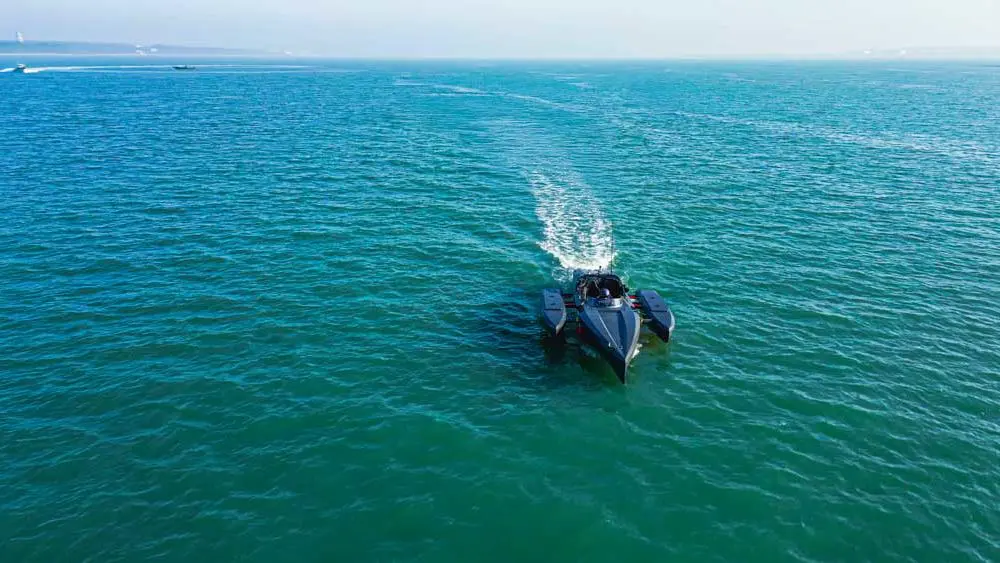
Hand crafted rose marks royal visit
Talented technical instructor crafts striking metal rose for royal SMART centre launch.
22 January 2026
12 June 2025 • by Solent press team
The successful completion of the trimaran fast ferry TriFoiler demonstrator project showcases how collaboration between academia and industry is fuelling innovation, enhancing student learning, and addressing real-world challenges in maritime engineering.
The electric trimaran vessel, developed by Chartwell Marine, in partnership with Southampton Solent University and Newcastle Marine Services, under the UK Government’s Clean Maritime Demonstration Competition (CMDC3), has concluded initial sea trials on Southampton water. This follows its successful on-time, on-budget launch in March.
Set out to explore the feasibility of zero-emission passenger ferries, sea trials revealed the TriFoiler is five times cheaper to run than an equivalent fossil fuel powered monohull vessel of the same size and displacement. Demonstrating clear potential for reducing energy consumption in commercial operations – with or without foils – the trials highlighted the suitability of the innovative electric trimaran for inland and inshore waterways ferry operations, such as the Solent and other categorised waters across the UK.
The project was part-funded by a £1.86 million grant via UK SHORE programme – a Department for Transport (DfT) initiative – delivered by Innovate UK, part of UK Research and Innovation (UKRI).
“Successfully completing the TriFoiler project is a big milestone and testament to the team’s hard work. The sea trial results clearly show that a trimaran, coupled with electric propulsion systems, will provide an efficient, reliable and environmentally friendly solution for the ferry industry,” says Andy Page, Managing Director at Chartwell Marine.
“Working closely with Solent University and Newcastle Marine Services, we’ve taken this promising concept from R&D to real-world testing, and the results are encouraging. This was delivered by a dynamic, nimble team in a short time frame, and shows real commercial promise.”
Pairing a lightweight trimaran hull with electric propulsion, the TriFoiler achieves high efficiency and manoeuvrability at both high and low speed. Its enhanced stability, made possible by the trimaran configuration and foil-mounted electric motors positioned widely on the foil, offers a simple, robust design, using commercial off the shelf equipment that has the potential to meet the demands of day-to-day commercial operations.
“The project exemplifies how collaboration between academia and industry can accelerate innovation,” said Giles Barkley, at Southampton Solent University. “We created a full-size digital twin of the vessel to replicate its performance on water at the University. Now validated with data from the trials, this enables us to enhance future designs while also supporting the training and development of the next generation of naval architects.”
Mike Biddle, Executive Director for Net Zero at Innovate UK, said: "Chartwell Marine’s TriFoiler technology is a good example of UK innovation driving decarbonisation in a vital international sector. It shows that net zero doesn’t mean compromise – delivering lower emissions can also be cheaper to run, faster and more manoeuvrable.
“We’re proud to work in partnership with DfT to deliver the UK SHORE programme and this demonstration exemplifies everything it set out to achieve, paving the way for a more sustainable, efficient and investable UK maritime transport sector."
Further testing will resume on the vessel incorporating the latest findings to inform the next stage of development.
